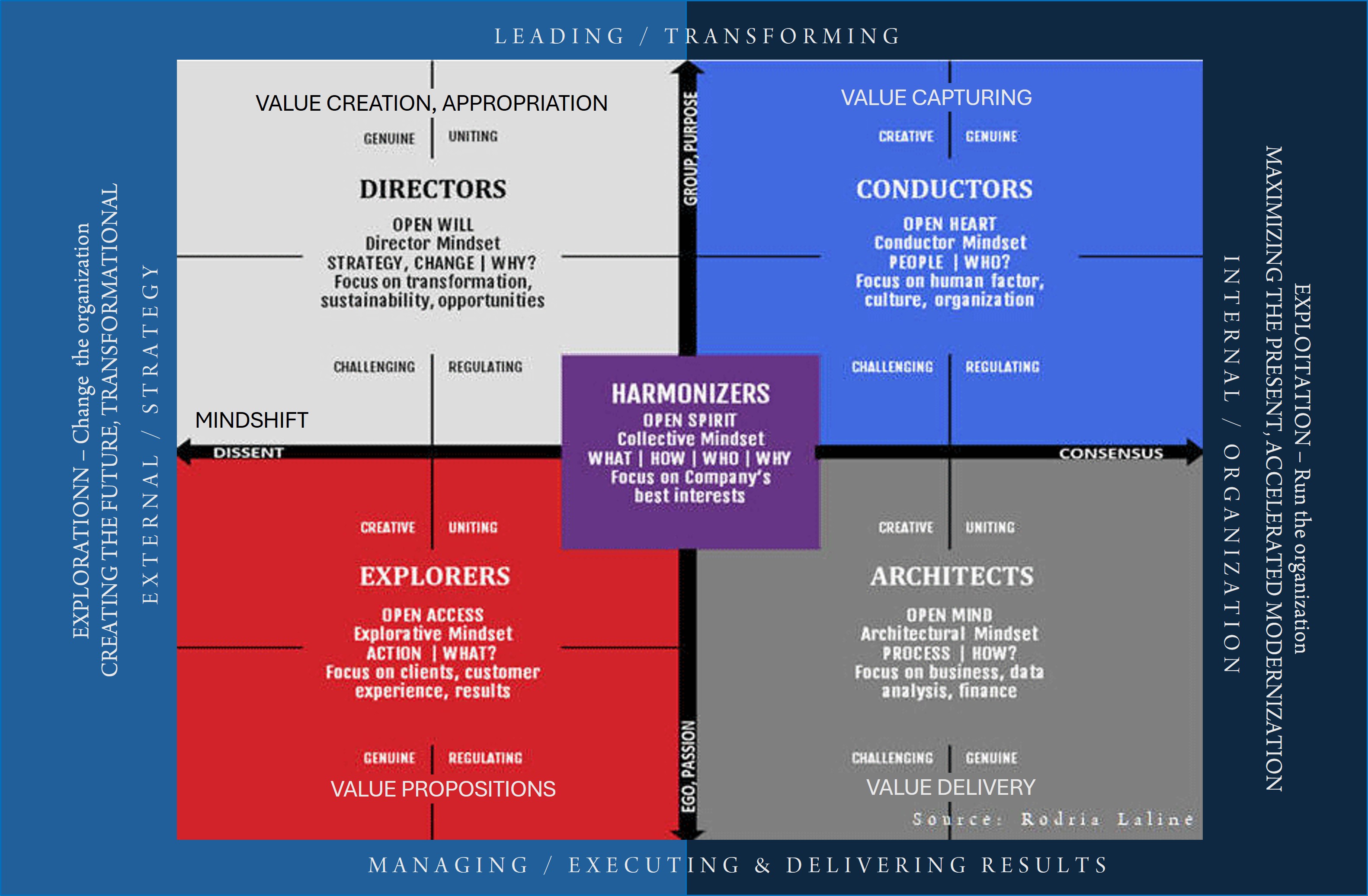LEADERSHIP
Transforming Leadership Styles for
Horizontal Governance.
A
Call to Action for the Board: Embracing Systemic Change.
The transformation from vertical to horizontal governance is not just a theoretical shift—it is a strategic imperative. As leaders, we must drive systemic change by fostering collaborative, agile, and purpose-driven organizations that respond effectively to evolving societal and market dynamics. This requires breaking down hierarchical silos, empowering decentralized decision-making, and embedding trust-based leadership at every level.
To successfully lead this transition, we must embrace new leadership paradigms, focusing on ethics, sustainability, adaptability, and systems thinking. Our role as a Supervisory Board is not merely to oversee but to actively guide, enable, and accelerate this shift.

Systemic Leadership Transformation
To operationalize this transition, leadership must evolve across four key complexities:
1. Contextual - The Explorers, Creating Social Value Propositions
Organizations must act as explorers of new social and business values. This requires:
Identifying emerging
opportunities and societal needs to craft innovative
value propositions.
Encouraging continuous
learning through cross-disciplinary collaboration.
Engaging diverse
stakeholders in problem-solving using
design-thinking methodologies.
Experimenting with new
solutions by piloting projects that challenge
conventional norms and redefine industry boundaries.
2. Cognitive - The Architects, Building the Capacity for Change
Once new opportunities are identified, architects must structure the organization to deliver them:
Integrating diverse perspectives into clear, coherent, and strategic transformation initiatives.
Defining measurable goals and aligning them with sustainable, adaptable business models.
Leveraging technology and digital ecosystems (AI, IoT, cloud-based platforms) to enhance efficiency and scalability.
Strengthening financial and ICT infrastructure to support agile decision-making and real-time adaptability.
Decentralizing budget allocations by ensuring financial resources are distributed to local teams,
enabling them to take ownership of initiatives while maintaining strategic alignment.
3. Societal - The Conductors, Driving Stakeholder Engagement
True transformation cannot happen in isolation - it requires a networked approach. Conductors must:
Build trust-based partnerships with internal and external stakeholders to co-create value.
Facilitate collaboration and inclusivity through transparent decision-making and participatory leadership.
Strengthen cultural
adaptability by anticipating trends, leveraging scenario planning, and fostering cross-cultural competencies.
Encourage collective intelligence by integrating diverse stakeholder perspectives into governance.
Empower teams with financial autonomy make localized decisions without waiting for centralized approval, ensuring responsiveness and ownership at every level.
4. Mindshift - The Directors, Strategic Pivot and Governance Innovation<
Directors must lead the mindset shift that enables transformation to take root:
Adopt an agile governance model that promotes continuous adaptation and rapid strategic pivots.
Flatten organizational hierarchies to empower distributed decision-making and shared accountability.
Drive transformational growth by merging traditional expertise with emerging digital and governance innovations.
Shift the board's role from controller to enabler, moving from directive oversight to creating conditions where teams canm independently drive transformation and innovation.
What does this mean for the Supervisory Board?
For horizontal governance to take root, the Supervisory Board must take decisive action in key areas:
The Board Governance Committee:
fostering a leadership culture that decentralizes decision-making and budget control, enabling teams to have both the freedom and responsibility to act effectively. This includes measuring the effectiveness of decentralized financial governance and stakeholder-driven decision-making.
The Board Audit Committee:
moving beyond traditional financial oversight to assess whether teams have the necessary autonomy, resources, and accountability structures to act effectively. This includes measuring the effectiveness of decentralized financial governance and stakeholder-driven decision-making.
The Renumeration Committee: shifting from rewarding hierarchical leadership to incentivizing collaborative, decentralized decision-making and leadership behaviors that drive systemic change. Compensation structures should encourage empowerment, team accountability, and value-driven execution at all levels.
Moving from Awareness to Execution<
To move beyond conceptual understanding and drive real change, the Supervisory Board should take the following actions:
Redesign budget allocation processes to distribute financial resources to local teams, giving them the autonomy and responsibility to drive impact.
Reposition the board role as an enabler of transformation rather than the sole driver, ensuring decision-making authority rests where the real impact happens.
Launch leadership development programs
that train executives and middle managers in facilitation, decentralized governance, and adaptive leadership.
Create new governance metrics that measure autonomy, effectiveness of distributed decision-making, and stakeholder trust, ensuring the transition is managed effectively.
The board's role is not to wait for the future - it is to create it together.
The Supervisory Board must actively decentralize budget control and change its own role to that of enabler and facilitator rather than top-down driver. It also ties decentralization directly to governance, audit, and remuneration, ensuring alignment across all key board functions. By committing to this transformation, we create an agile, responsive, and stakeholder-driven organization - one that thrives in a world where leadership is not about conttrol, but about empowerment and facilitation.

